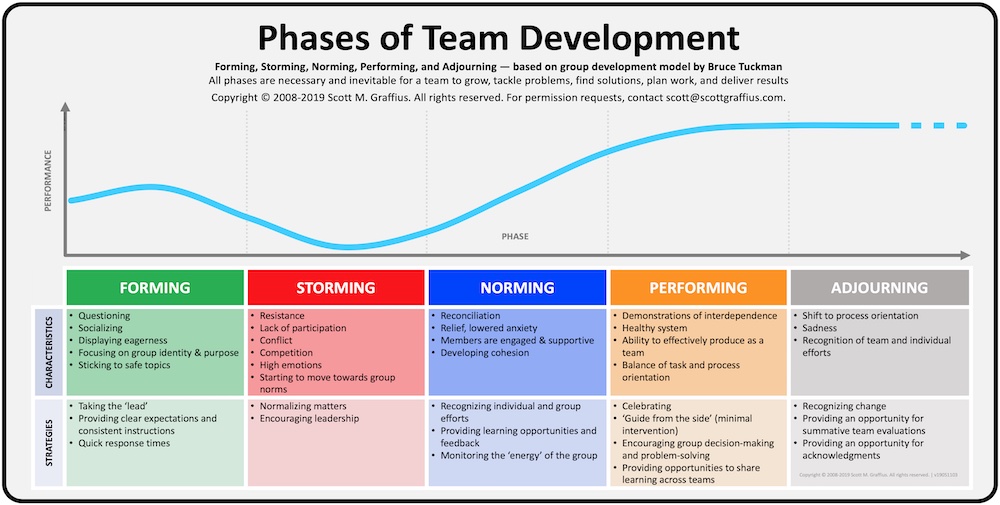Tuckman's theory focuses on the way in which a team tackles a task from the initial formation of the team through to the. Bruce tuckman presented a model of five stages forming, storming, norming, and performing in order to develop as a group.

Картинки по запросу forming storming norming performing
Tuckman, an american psychological researcher, in 1965.

Group work forming storming norming performing. According to tuckman, the listed stages are obligatory for a team to: Forming, storming, norming and performing. This is also referred to as deforming and mourning.
When you understand it, you can help your new team become effective more quickly. The best known universal scheme for group development was advanced by bruce tuckman, which included four stages: The team meets and learns about the.
However, the focus for group members during the forming stage is to become familiar with each other and their purpose, not on work. This stage is when team members come together and are focused on learning about each other, understanding the rules of the group and being accepted by the group. This is the bringing together of strangers in the hopes they'll eventually be able to work as a highly functioning team.
Introducing tuckman's model psychologist bruce tuckman first came up with the memorable phrase, “forming, storming, norming, and performing” in 1965. Bruce tuckman's forming, storming, norming, and performing model describes these stages. By understanding it, you can help your team to become productive more quickly.
Forming a team takes time, and members often go through recognizable stages as they change from being a collection of strangers to a united group with common goals. This means that the process of forming a team that can work together effectively to realize a goal is. This model describes five stages that every team goes through during its development.
A fifth stage was later added called. Each of these words represent one stage in the model, which individuals inevitably must go through as they form a group into a team. While his theory shows a sequence of events, there's emphasis on the fact that the stages may repeat or extend.
Forming storming norming performing describes the four essential stages of team development, as first codified in the work of psychologist bruce tuckman in 1965. Forming, storming, norming, performing and adjourning. By understanding this model, it can help take away the unpredictability of forming teams and allow you, and your team, a better chance at.
5 stages of group development; Are (1) forming, (2) storming, (3) norming, (4) performing and (5) adjourning. The forming, storming, norming, and performing model describes these stages.
For permanent work groups, performing is the last stage in their development. Bruce tuckman refined his theory in 1975 and added a fifth stage to the 'forming, storming, norming, performing' model: Tuckman provides a realistic understanding of group development.
The storming stage is necessary to iron out problems and for group members to work out where. Later, a fifth stage was added, called ‘adjourning’ or ‘mourning’. In this stage, individuals are on their best behavior and striving to learn.
Group development, forming, storming, norming, performing, adjourning suggest keywords: Forming, storming, norming and performing. These stages are universal to all teams despite the group's members, purpose, goal, culture, location, demographics and so on.
The concept of forming, storming, norming and performing (fsnp) describes the four stages of psychological development a team goes through as they work on a project. The idea originated in 1965 with american. Teams move through each stage as they overcome challenges, learn to work together and eventually focus on accomplishing a shared goal.
In the first phase, forming, teams are uncertain about the team goals and how to work together.in the second phase, storming, teams challenge boundaries and get to know each other and how to work together.in the norming phase, teams. It is one of the more known team development theories and has formed the basis of many further ideas since its conception. In 1965, bruce tuckman proposed five stages of team development:
Orientation (forming stage) power struggle (storming stage). Some believe this cautious behavior prevents the group from getting any real work done. This model was first developed by bruce tuckman in 1965.
Try breaking large goals down into smaller, more manageable tasks. The model initially consisted of four distinct stages of group formation: You can help the team break through the storming stage by encouraging members to refocus on goals.
They represent the necessary and inevitable stages from facing challenges, tackling problems, finding solutions and planning work to ultimately delivering. Forming, storming, norming and performing. The adjourning stage is the fifth, and final, stage of group development that occurs when a group wraps up its work and then dissolves.
In the first stage of the forming, storming, norming and performing model is forming. The tuckman model describes the phases that groups of individuals go through when they first begin working together as a team.
Norming Performing Storming Forming

Team Development Forming Storming Norming Performing Stages Process

Forming Storming Norming Performing Exceptional PPM and PMO Solutions

17 Best images about Work Building Effective Teams on Pinterest
